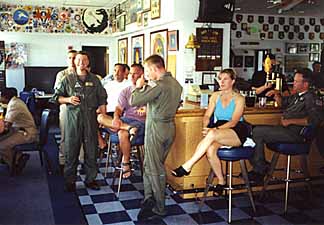All servicemen were allowed to drink alcohol at base clubs until two decades ago. Unfortunately, the Armed Services raised the on-base drinking age to 21 to match political moods in the USA, and save base commanders from headaches. This well intentioned change caused serious problems. Studies show that over 70% of 18-20 year-old Americans drink alcohol on a regular basis. If not allowed to drink in a legal establishment, they drink in cars, parking lots, beaches, parks, or in Mexico. This is one cause for the increase in teenage crime and gang activity.
This restriction is dangerous for teenage servicemen since they are far from home, where they once drank at homes of friend and relatives. Those wanting a drink after arriving at a new base often fall prey to local criminals. Finally, young GIs returning from a year of combat duty are irritated that they can't have a beer with their dad at the club because they are "too young." All servicemen should be allowed to drink alcohol at base clubs in a controlled social environment in which responsible drinking is emphasized. Base clubs can adopt various rules, such as:
1) no promotional discounts to encourage drinking;
2) no "shots" or double/triple drinks would be served;
3) bartenders and waitresses would be encouraged to cut off heavy drinkers;
4) Alcohol abuse counselors could roam clubs on busy nights;
5) Clubs could stop serving alcohol at midnight, but continue to serve other drinks until closing time.
6) GIs who abuse alcohol at clubs or elsewhere, would face the prospect of being banned from local military clubs for a period of time.
7) GIs 18-20 years old could be limited to beer. Plastic wristbands could affixed to GIs and civilians under age 21 by the door checkers, as is done in bars in some states in the USA.
Alcohol at base clubs would keep GIs away from drug dealers, prostitutes, gangsters, con men, and drunk civilians off-base. It will reduce DUIs since GIs can drink and the club and walk to their barracks. In addition:
1) base clubs would generate millions of dollars in profits;
2) the suicide rate would decline since young GIs could blow off steam with a few drinks;
3) teenagers would be more interested in enlisting;
4) the service academies would have fewer problems if cadets and midshipmen could drink aboard their academy.
5) GIs would be involved in fewer drunken incidents in Mexico.
6) GIs would be involved in fewer drunken incidents at overseas posts (where the drinking age is 18) if they learned to drink responsibly back home.
Political leaders should agree that Americans who are old enough to die for their country are old enough to have a few drinks on base, especially since banning drinking is counterproductive. This does not mean that GIs could buy liquor to take out, or frequent bars off base. The military can ensure that young GIs drink responsibly at home, in the same way many parents and relatives allow teenagers to have a few drinks at home. If anyone questions why social activities require alcohol, perhaps they can explain why every social activity in Washington DC includes alcohol. Unit esprit is enhanced when young GIs agree to meet at the club for a beer, rather than cruise the streets off-base looking for fun. Finally, young GIs could brag to civilians that they are legally allowed to drink at base clubs, which is good for morale and recruitment.
Carlton Meyer editorG2mil@Gmail.com
©2008 www.G2mil.com